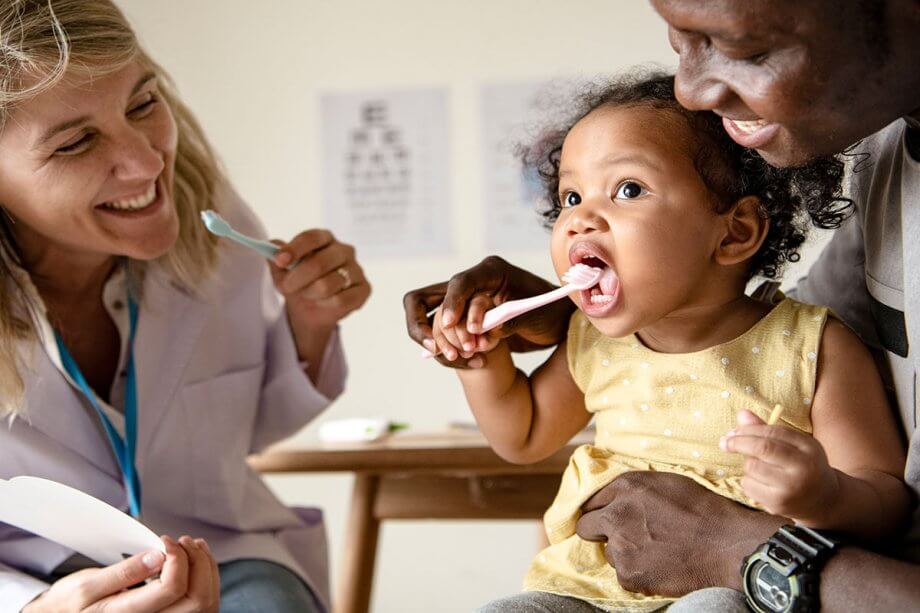Practicing oral hygiene and having good oral hygiene habits are important at any age – brushing, flossing, and other oral hygiene practices keep teeth looking and working their best. Like all good habits, learning good oral hygiene as a toddler can lead to practicing good oral hygiene as an adult.
Even though they are temporary, a child’s primary teeth are important for speech development, for chewing food properly, and for maintaining a healthy space into which permanent teeth will someday grow. Good oral hygiene promotes the healthy development of a child’s primary teeth, jaw, and oral cavity. Practicing oral hygiene also keeps a child’s smile looking its best. The habits learned in childhood can last a lifetime, and good oral hygiene habits learned in childhood can lead to healthy, attractive teeth throughout adulthood.
A Lifetime of Healthy Smiles Begins in Early Childhood
Dental hygiene should begin when a child is a baby, before primary teeth erupt through the gums. A parent can use a piece of gauze or washcloth to clean an infant’s mouth. Tooth decay can start as soon as a tooth appears above the gum line, which usually happens at about six months of age. Tooth decay in infants and toddlers, known as “baby bottle tooth decay,” occurs most often in the upper front teeth. This happens when a baby is put to sleep with a milk bottle in their mouth which they succle throughout the night. Putting a baby to bed with a bottle should be avoided to prevent this decay. Learn more about preventing tooth decay.
Parents should brush a child’s teeth twice a day with a child-sized toothbrush until the child is old enough to brush his or her own teeth. A smear of toothpaste, about the size of a grain of rice, is the right amount to use for children younger than 3 years. A pea-sized dab of toothpaste is the right amount for children ages 3 years and older.
This is the best time to teach a child how to take care of his or her teeth is while the child is still a toddler. Parents should teach a child how to hold a toothbrush, how much toothpaste to apply, and how and when to use dental floss. This is also a great time to instill good oral hygiene habits, such as brushing twice a day, flossing once daily, and going to the dentist regularly to maintain good oral health and a great smile.
Pediatric Dental Services for a Lifetime of Healthy Teeth and Good Oral Hygiene
For optimal results throughout a lifetime, a child should start regular visits to a dentist when he or she is 2 years old. Early dental visits help keep primary teeth healthy and help to normalize the experience of regular dental check ups. This is very important in preventing a child’s fear of the dentist. This fear often manifests when a child only sees the dentist when there is a cavity or pain. Making sure the first dental visit is a positive one greatly enhances the chance that the child will grow up without this fear. As a result these early visits help to establish good dental habits that will benefit a child for a lifetime.
Pediatric dental services focus on the unique dentistry needs of children. A child’s mouth and teeth continually grow and develop, even as permanent teeth erupt from the gum and replace “baby teeth.” A pediatric dentist receives special training in the diagnosis and treatment of dental health issues commonly affecting children.
Pediatric dental services, also known as pedodontics, include dental exams and cleanings, along with a number of other procedures that keep a young child’s teeth and gums healthy. Pediatric care for toddlers may include fluoride treatments to protect teeth from tooth decay and dental sealants to prevent cavity-causing agents, such as food and plaque, from hiding in tiny crevices in the teeth.
A child’s first visit to a pediatric dentist will include a thorough evaluation of his or her teeth and an examination of the child’s head and neck. The dentist will take x-rays only when necessary. If the child does not need further treatment, the pediatric dentist will clean the child’s teeth and apply fluoride. Parents are encouraged to accompany their child during this visit.
For more information on toddlers and teeth, and tips on instilling good oral hygiene habits in young children, contact us at McDonald Family Dentistry in Morgan Hill, CA. Our dentist, Dr. Andrew McDonald, offers quality dental care for toddlers and for the whole family in a modern and relaxing office. Call us today at 408-779-9335 to schedule an appointment.
